 Pirates and Privateers Pirates and Privateers
The History of Maritime
Piracy
Cindy Vallar, Editor
& Reviewer
P.O. Box 425,
Keller, TX 76244-0425
    
Stede Bonnet (continued)
Rules Shouldn’t Be
Broken
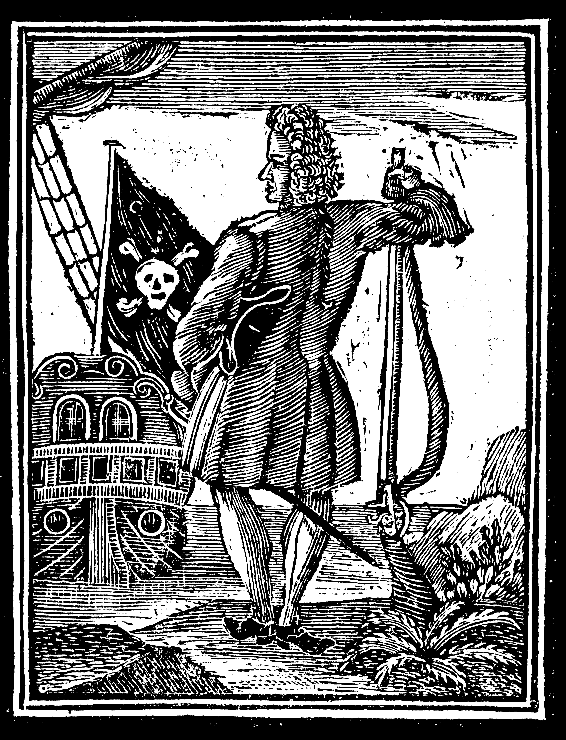 The norm
among pirates was to band together and
“earn” their wages by seizing other
vessels to garner shares of the plunder
taken. This wasn’t what Stede Bonnet chose
to do. Instead, he paid his men wages.1
After he and his hired crew set sail from
Barbados, they went hunting. One might
think they had little chance of success,
but some of his 126 men knew enough to
guide their captain toward potential prey.
As they sailed northward along the eastern
seaboard of Britain’s North American
colonies, they captured at least four
vessels, including Anne, Turbet,
Endeavour, and Young. From
these prizes, the pirates seized
“Provisions, Clothes, Money, Ammunition,
etc.” (Moss, Life, 16) The norm
among pirates was to band together and
“earn” their wages by seizing other
vessels to garner shares of the plunder
taken. This wasn’t what Stede Bonnet chose
to do. Instead, he paid his men wages.1
After he and his hired crew set sail from
Barbados, they went hunting. One might
think they had little chance of success,
but some of his 126 men knew enough to
guide their captain toward potential prey.
As they sailed northward along the eastern
seaboard of Britain’s North American
colonies, they captured at least four
vessels, including Anne, Turbet,
Endeavour, and Young. From
these prizes, the pirates seized
“Provisions, Clothes, Money, Ammunition,
etc.” (Moss, Life, 16)
From the pirates’ perspective, this was
good. Stede’s reaction wasn’t quite the
same. Why? It just so happened that Turbet
hailed from his hometown (Bridgetown,
Barbados). That meant the possibility of
recognition. Whether his intentions were
to return home one day with no one the
wiser about his misdeeds, or he didn’t
wish his nefarious activities to reflect
poorly on his family, he did not wish
others to know his true identity. (Which
was why he insisted that his crew call him
“Captain Edwards.”) In snaring Turbet,
there was a good chance that one of the
captives might recognize him, or if he
permitted them to sail away with their
vessel, someone on Barbados might put two
and two together and figure out the truth.
No, he couldn’t allow that to happen.
Whereas Anne, Endeavour,
and Young were permitted to be on
their merry way, Turbet was set
aflame. Thereafter, the pirates went
hunting anew, going as far north as New
York before sailing south again.
Stede succeeded in keeping his identity a
secret as much as he knew how to navigate.
(In other words, he failed miserably.) By
the time they reached Charles Town
(present-day Charleston, South Carolina)
in August, the authorities already knew
the truth. In fact, Captain Bartholomew
Candler of HMS Winchelsea made
sure they knew.
. . . lately on the Coast a
Pirate Sloop from Barbados Command by
one Major Bonnett [Bonnet], who has an
Estate in that Island and the Sloop is
his Own, this Advice I had by Letter
from thence, that in April last [1717]
He ran away out of Carlisle Bay in the
night he had aboard 126 men 6 Guns
& Arms & Ammunition Enough[.]
(Moss, 22)
Whether Stede
knew of this or not, he was determined to
prey on ships entering and leaving the
city. He didn’t have long to wait either.
A brigantine, captained by Thomas Porter,
was the first to fall into his trap. As
soon as he saw their black flag, Porter
hauled down his own and grudgingly allowed
the pirates to ransack his ship. What they
found didn’t amount to much in monetary
terms, but Stede refused to allow the
brigantine to continue on her way. If he
released them, Porter was certain to
report to the authorities the minute he
docked in Charles Town, which would ruin
any chance the pirates had of garnering
more booty to place in Revenge’s
hold.
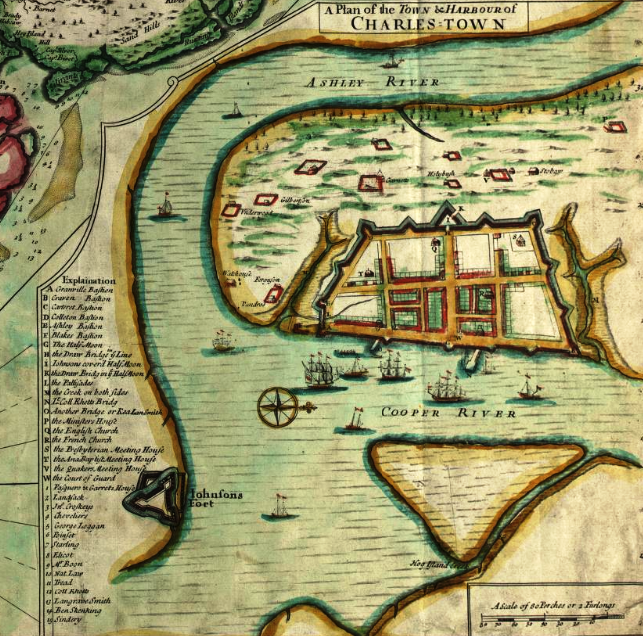
1711 inset of Charles
Town from A Compleat
description of the province of
Carolina in 3 parts,
published by Edward Crisp,
London. (Source: Library of
Congress)
The strategy worked, for soon after,
Captain Joseph Palmer’s sloop was taken.
This time, the pirates found sugar,
slaves, and rum – all worthy commodities
as far as they were concerned. Stede was
happy that his men were satisfied with
their haul, but he faced a dilemma.
Palmer, too, was from Barbados, and he and
his men recognized Stede. The only thing
to do, from his perspective, was to take
all the captives and their ships and seek
a temporary haven.
Cape Fear River provided just the spot,
and the pirates took advantage of it to
careen Revenge. Once their work
was finished and all their plunder was
stowed, they herded the captives onto
Porter’s brigantine, torched Palmer’s
sloop, and freed them, albeit with only a
small portion of the rigging and sails
needed for the brigantine to go anywhere.
Her speed was so limited, it took the
captains and their men four weeks to reach
Charles Town; they arrived there on 17
September 1717. Naturally, the captains
headed straight to the governor to warn
him.
As for the pirates, they had a decision to
make. Only they couldn’t agree on where
their next hunting grounds should be. So
they sailed for the Straits of Florida.
That’s where lookouts spotted a much
bigger vessel flying Spanish colors. Now,
pirates had an unwritten rule of thumb: if
the potential prey is bigger than you,
avoid her like the plague. Thinking her to
be a merchant ship and allowing his
previous successes to go to his head,
Stede ignored this wisdom. After all, it
was common knowledge that many merchant
ships carried Quaker guns. (These
“weapons” were actually made of wood and
painted black to look like the real
thing.) Except the guns this ship carried
weren’t fake. Nor was she a merchant ship.
She was a warship with greater firepower
and her captain knew exactly what to do.
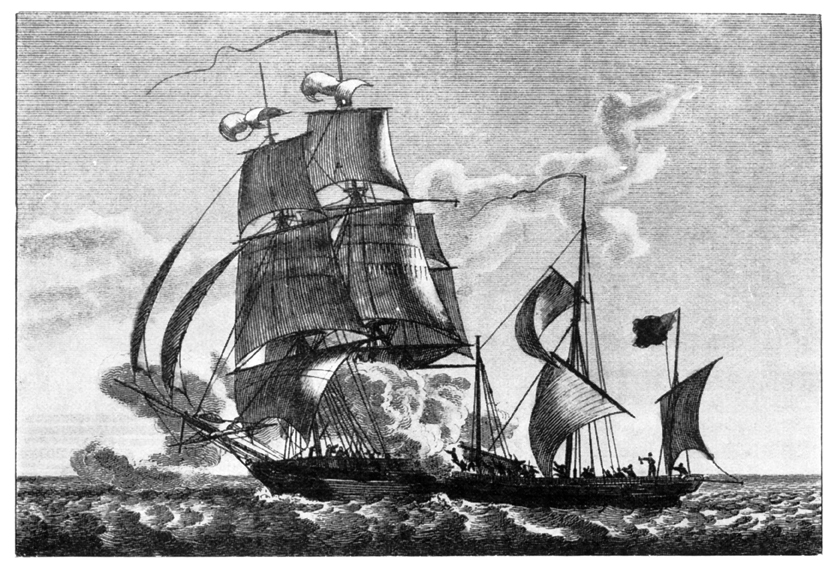 When Revenge
sailed parallel to the Spanish ship,
her captain ordered his men to unleash a
broadside at the pirates. Then he
positioned his vessel so it sailed across
Revenge’s stern. Many pirates fell
from the sweeping broadside, including
Stede. Others were killed or injured when
the stern was hit. Those who survived
these attacks had one priority – get away
from the Spaniards as soon as possible. When Revenge
sailed parallel to the Spanish ship,
her captain ordered his men to unleash a
broadside at the pirates. Then he
positioned his vessel so it sailed across
Revenge’s stern. Many pirates fell
from the sweeping broadside, including
Stede. Others were killed or injured when
the stern was hit. Those who survived
these attacks had one priority – get away
from the Spaniards as soon as possible.
Once clear, a tally was taken. Thirty to
forty of their comrades had fallen. Stede
was unconscious and taken below to what
remained of his cabin. The shots had
smashed through glass and wood, decimating
furniture and anything else in their path.
His precious books were scattered all
about the deck. Once he regained
consciousness, Stede did not stray from
his cabin until after the much-damaged Revenge
reached New
Providence in the Bahamas.
A decade earlier, John Graves published a
treatise about New Providence, where he
had once had the unenviable job of
collecting customs. He believed the island
would make an ideal “Shelter
for Pyrates, if left without good
Government and some Strength.” He added
that it would only take “one small Pyrat
with Fifty Men that are acquainted with
the Inhabitants” to “Ruin the Place[.]”
(Fictum) By 1714, his prognostication had
come true. Three years later, the pirates
were firmly entrenched in Nassau, and one
of them was a man named Edward
Thache (Blackbeard).
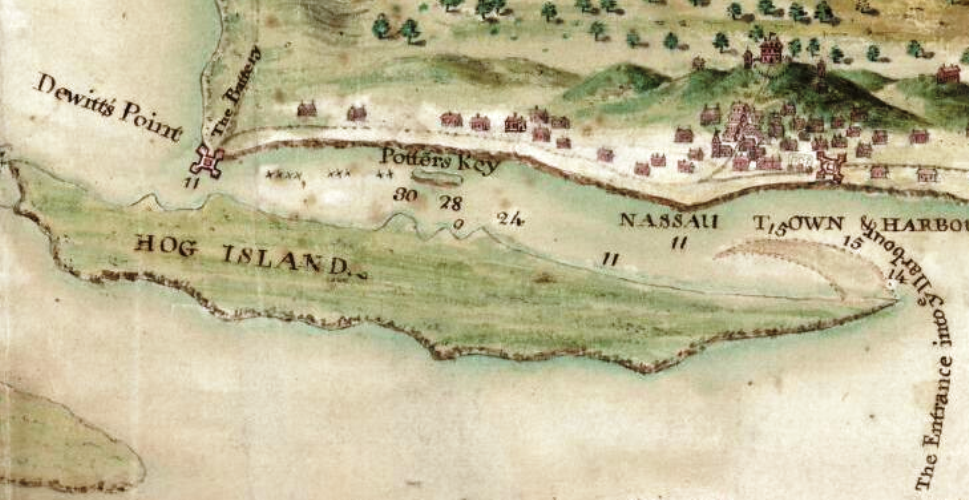
Enlarged segment of
"An exact draught of the island of
New Providence
one of the islands in the Bahamas
West Indies," 17--. (Source: Library of
Congress)
Whether he and Stede were previously
acquainted – Thache did have ties to
Barbados – or perhaps he was just curious
about this strange captain who enjoyed
reading and had the gumption to attack
Spanish men-of-war, or he desired a second
ship (he already had “a sloop 6 guns and
about 70 men”), he persuaded Stede to turn
over command of Revenge to him.
(Marley, 789) In exchange, Thache would
teach him what he needed to know to be a
pirate captain. To Stede’s way of
thinking, what could be better? He would
add to his repertoire of knowledge as
regards sailing and pirating without the
burden of command, and he could do so at
his leisure. In the meantime, his cabin
would remain his domicile, where he could
read to his heart’s content and take as
long as he deemed necessary to recuperate.
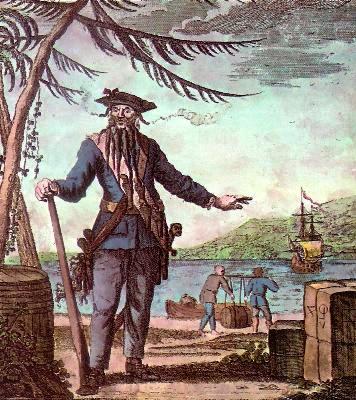 While
Thache oversaw repairs, he also improved Revenge’s
armament by adding two more guns and
signing on more men. When they departed
New Providence, his crew numbered 150.
Their ultimate destination was Delaware
Bay, but there were plenty of prey to
capture along the way. In short shrift,
they plundered fifteen vessels. James
Logan, chief steward of William
Penn’s colony and a Philadelphia merchant,
made mention of these seizures on 24
October 1717. While
Thache oversaw repairs, he also improved Revenge’s
armament by adding two more guns and
signing on more men. When they departed
New Providence, his crew numbered 150.
Their ultimate destination was Delaware
Bay, but there were plenty of prey to
capture along the way. In short shrift,
they plundered fifteen vessels. James
Logan, chief steward of William
Penn’s colony and a Philadelphia merchant,
made mention of these seizures on 24
October 1717.
We have been very much
disturbed this last week by the
Pirates They have taken and plundered
Six or Seven Vessels bound out or into
this river Some they have destroyed
Some they have taken to Their own use
& Some they have dismissed after
Plunder.
. . .
The Sloop
that came on our Coast had about 130
Men all Stout Fellows all English
without any mixture Double armed they
waited they Said for their Consort a
Ship of 26 Guns to whom when joyned
they designed to Visit Philadia,
Some of our Mastr Say They
know almost every man aboard most of
them having been lately in this River,
their Comandr is one Teach
who was here a Mate from Jamia
about 2 yr ago. (Logan)
One master who
docked in Philadelphia reported the
seizure of his ship on 24 October 1717,
and the incident was reprinted on page two
of the Boston
News-Letter.
He was taken about 12
days since off our Capes by a Pirate
Sloop called the Revenge, of 12 Guns
150 Men, Commanded by one Teach . . .
They have Arms to fire five rounds
before they load again.
(Philadelphia)
The pirates
tossed most of the cargo found in the hold
overboard. Two additional snows, whose
cargo also went by the board, were
captured and one joined the fleet of
pirate vessels. From a sloop, captained by
Peter Peters,
they took 27 Pipes of
Wine, cut his Masts by the Board,
after which She drove ashore and
Stranded. (Philadelphia, 2)
Another
provided them with “two Pipes of Wine”
before the pirates sank her.
(Philadelphia, 2) Loose-lipped pirates,
whether accidentally or on purpose, “told
the Prisoners that they expected a Consort
Ship of 30 Guns, and then they would go up
into Philadelphia, others of them said
they were bound to the Capes of Virginia .
. . .” (Philadelphia, 2)
These captives also made mention of Stede.
On board the Pirate Sloop
is Major Bennet, but has no Command,
he walks about in his Morning Gown,
and then to his Books, of which he has
a good Library on Board, he was not
well of his wounds that he received by
attacking of a Spanish Man of War, who
kill’d and wounded him 30 or 40 Men.
(Philadelphia, 2)
(Think about
it. Had Stede not broken the rule about
going after larger ships, he wouldn’t have
suffered such a disabling wound. He might
have been in a better frame of mind to
fully understand that in giving Thache
command of Revenge, Stede lost his
ship and crew. He would not, as he would
later claim, have felt himself “a
prisoner” for nearly a year.)
Vengeance Is Mine
Edward Thache’s depredations
continued. Additional confirmation of
Stede being in league with him, although
no details of their arrangement were
provided, came in a letter to the
Admiralty, dated 4 December 1717. Captain
Ellis Brand of HMS Lyme wrote:
Since my Arrival in
Virginia I have heard but of one pyrot
sloop, that was run away with, from
Barbadoes commanded by Maj[o]r
Bonnett, but now is commanded by one
Teach, Bonnet being suspended from his
command, but is still on board, they
have most infested the Capes of
delaware and sometimes of Bermudas,
never continuing forty eight hours in
one place, he is now gone to the
So[uth]ward. (Moss, 49)
What Brand
might not have known was that Thache
had snared quite a ship a few weeks
earlier. On 17 November, La
Concorde had the misfortune of
crossing his path and he did not hesitate.
Aside from the ship, which would be
renamed Queen
Anne’s Revenge (QAR),
the pirates acquired bags of gold dust,
and two carpenters, a caulker, a cook,
three doctors, a gunsmith, and a navigator
were forced to join Thache’s crew. Since
Stede had recovered from his wounds, he
resumed command of Revenge because
Thache quit the sloop in favor of the
ship.2
Model
of Balckbeard's Queen Anne's Revenge
in the North Carolina Museum of History by
Qualiesin, 2020 (Source: Wikipedia
Commons)
The marauding continued, with Stede and
Thache sailing in consort. On 6 January
1718, Walter Hamilton, governor of the
Leeward Islands, wrote:
. . . we did see another
pirate ship and a large sloop which we
were informed when we came off of the
Island St. Eustatius by a sloop sent
express from St. Christopher’s were
two other pirates that had two days
before taken some of the trading
sloops off of that Island and sunk a
ship loaden with white sugar etc. . .
. The ship is commanded by one
Captain Teatch, the sloop by one Major
Bonnett an inhabitant of Barbadoes,
some say Bonnett commands both ship
and sloop. . . . The ship some say has
22 others say she has 26 guns mounted
but all agree that she can carry 40
and is full of men the sloop hath ten
guns and doth not want men.
(America, Jan. 6. 298.)
HMS Seaford
and HMS Scarborough went
seeking the pirates, but their search
proved fruitless. Probably because they
were looking in the wrong places. The
pirates were off the island of Rattan (Roatán)
near Honduras, more than a thousand miles
distant.
Since Thache wanted to careen his new
flagship, Stede opted to go hunting on his
own. Which is when he happened upon a
potential prize. Perhaps he had forgotten
the painful lesson of attacking a larger
ship. Perhaps he wanted to outshine
Thache, because if he successfully
captured the Protestant Caesar,
Stede would command a vessel larger than
Thache’s. Or perhaps he just wanted to
prove that the lessons he learned while
sailing with Thache had stuck. Whatever
his motivation, Stede chose to attack the
400-ton merchantman even though she was
about four times larger than Revenge and
she carried sixteen more guns than Revenge’s
ten.
Captain Wyer, master of the Protestant
Caesar (PC) had no intention
of surrendering his ship and fifty men.
[O]n the 28th of March last
about 120 Leagues to the Westward of
Jamaica, near the Latitidue 16. off
the Island Rattan, espyed a large
Sloop which he supposed to be a
Pirate, and put his Ship in order to
Fight her, which said Sloop had 10
Guns and upwards of 50 Men, and about
nine a Clock at Night came under Capt.
Wyers Stern, and fired several Cannon
in upon the said Ship and a Volley of
small Shot, unto which he returned two
of his Stern Chase Guns, and a like
Volley of small Shot, upon which the
Sloop’s Company hail’d him in English,
telling him that if he fired another
Gun they would give him no Quarter,
but Capt. Wyer continued Fighting them
till twelve a Clock at Night, when she
left the Ship . . . . (Boston, 16
June 1718, 2)
Having fled
under the cover of darkness, Revenge headed
to Turneffe (off the coast of Belize) to
make repairs. They reached the lagoon on 2
April 1718, only to find another ship
anchored there. While Stede’s men might
have rejoiced at seeing the QAR,
his reaction was probably far different.
The Revenges had tired of being shot up
unnecessarily and not gaining the wealth
they desired. They petitioned Thache to
address this situation. His solution was
to replace Revenge’s captain.
Stede was out and a man named Richards was
in. According to Captain Johnson, Thache
took the Major on aboard
his own Ship, telling him, that as he
had not been used to the Fatigues and
Care of such a Post, it would be
better for him to decline it, and live
easy and at his Pleasure, in such a
Ship as his, where he should not be
obliged to perform Duty, but follow
his own Inclinations. (Johnson,
71)
To say that
Thache was less than pleased with how
Stede handled the incident with the PC
would probably be an understatement.
Thache had nurtured a well-honed
reputation, and “surrender” was not in his
vocabulary. This matter needed to be
rectified, but before he was ready to
sail, Adventure sailed right into
his hands. A gunner aboard the QAR fired
a warning shot across the eighty-ton
sloop’s bow. Facing two pirate ships, Adventure’s
master, David Herriot, had little choice.
Five pirates came aboard and helped him
maneuver the boat close to QAR,
where the anchor was dropped.
Nor was this the only sloop that found
herself a victim of piracy. The Land
of Promise fell to the pirates a
short time later and Thache told her
master, Thomas Newton, “that he was, bound
to the Bay of Hunduras to Burn the Ship Protestant
Caesar . . . that Wyer might not
brag when he went to New England that he
had beat a Pirate.” (Boston, 16 June 1718,
2)
It was payback time, and this time
vengeance would be Thache’s, not the
Lord’s.
After Captain Wyer and his men had fended
off Revenge, they got busy loading
PC with “about 50 Tuns of
Logwood.” (Boston, 16 June 1718, 2)
European manufacturers of ink, furniture,
and dye prized this wood, making it a
lucrative trade; Spain, on the other hand,
considered all the logwood their property
and were keen on stopping outsiders from
“stealing” it. Which was why, when
lookouts aboard PC noticed five
vessels sailing toward them, they
initially assumed these strangers carried
Spaniards. Then the ship and the largest
of the four sloops hoisted “Black Flags
and Deaths Heads in them” while the three
smaller sloops flew “Bloody Flags.”
(Boston, 16 June 1718, 2)
Capt. Wyer judging them to
be Pirates, call’d his Officers and
Men up on Deck asking them if they
would stand by him and defend the
Ship, they answered, if they were
Spaniards they would stand by him as
long as they had Life, but if they
were Pirates they would not Fight, and
thereupon Capt. Wyer sent out his
second Mate with his Pinnace to
discover who they were and finding the
Ship had 40 Guns 300 Men called the Queen
Ann’s Revenge, Commanded by Edward
Teach a Pirate, and they found the
Sloop was the same that they Fought
the 28th of March last, Capt. Wyers
Men all declared they would not Fight
and quitted the Ship believing they
would be Murthered by the Sloops
Company, and so all went on Shore.
(Boston, 16 June 1718, 2)
 This
made easy pickings for the pirates. Three
days after the capture, This
made easy pickings for the pirates. Three
days after the capture,
Capt. Teach the Pirate sent
word on shore to Capt. Wyer, that if
he came on Board he would do him no
hurt, accordingly he went on Board
Teach’s Ship, who told him he was glad
that he left his Ship, else his Men on
Board his Sloop would have done him
Damage for Fighting with them; and
said he would burn his Ship because
she belonged to Boston, adding he
would burn all Vessels belonging to
New England for Executing the six
Pirates at Boston.3
And on the 12th of the said April
Capt. Wyer saw the Pirates go on Board
of his Ship, who set her on Fire and
Burnt her with the Wood. (Boston,
16 June 1718, 2)
On 31 May 1718,
Bermuda’s lieutenant governor wrote a
letter to the Council of Trade and
Plantations. Thache’s flotilla was quite
impressive, not to mention dangerous. The
QAR possessed “36 guns and 300
men,” while Revenge’s numbers were
“12 guns and 115 men.” On top of these,
there were “two other ships, in all which,
it is computed there are 700 men or
thereabt.” (America, May 31. Bermuda.
551.)
With such a formidable force, it was only
a matter of time before Bonnet, Thache,
and their men made a statement profound
enough to force authorities to take
action. This occurred in June 1718. The
target this time was the port of Charles
Town, South Carolina. While lying in wait
for about a week, according to David
Herriot, a captive turned pirate,
Thatch and Richards took
a Ship commanded by one Robert
Clark, bound from Charles-Town
aforesaid to London. Says, He
has heard by the Pirates there were
both Goods and Money taken out of the
said Clark’s Ship, but knows
not the Particulars, this Deponent
being then on board his own Sloop.
. . .
whilst they lay off the Bar of
Charles-Town, took another Vessel
. . . two Pinks . . . a Brigantine
with Negroes . . . and after
detaining them for some few Days, they
let them go again. (Information
of David, 45)
From Herriot’s
perspective, this was just another day. To
the citizens of Charles Town and the
victims who found themselves captives,
this was another thing entirely. Governor
Johnson wrote to the Council of
Trade and Plantations:
The unspeakable calamity
this poor Province suffers from pyrats
obliges me to inform your Lordships of
it . . . about 14 days ago 4 sail of
them appeared in sight of the Town
tooke our pilot boat and after wards 8
or 9 sail wth. severall of the best
inhabitants of this place on board and
then sent me word if I did not
imediately send them a chest of
medicins they would put every prisoner
to death which for there sakes being
complied with after plundering them of
all they had were sent ashore almost
naked. (America, June 18. 556.)
Eventually,
vengeance would become that of the pirate
hunters. This type of daring could not go
unpunished. But Thache still had a trick
up his sleeve, and Stede would not be
happy when he discovered it.
Temptation
After their successful blockade of
Charles Town, the pirates escaped all the
hue and cry. Thache had a plan, although
few were privy to his intentions. David
Herriot, the former master of Adventure
who was captured and turned pirate,
was not one of those few. After his
arrest, he told authorities of the
flotilla’s arrival at Topsail Inlet in the
Outer Banks of North Carolina six days
later.
 . . . having then
under their Command the said Ship Queen
Anne’s Revenge, the Sloop
commanded by Richards, this
Deponent’s Sloop, commanded by one
Capt. Hands, one of
the said Pirate Crew, and a
small empty Sloop . . . they had all
got safe into Topsail-Inlet, except Thatch, the said
Thatch’s Ship Queen Anne’s
Revenge run
a-ground off of the Bar of Topsail-Inlet, and the
said Thatch sent his
Quarter-Master to command this
Deponent’s Sloop to come to his
Assistance; but she run a-ground
likewise about Gun-shot from the said
Thatch, before
his said Sloop could come to their
Assistance, and both the said Thatch’s Ship and
this Deponent’s Sloop were wreck’d;
and the said Thatch and all the
other Sloop’s Companies went on board
the Revenge . . . and
on board the other Sloop . . . . . . . having then
under their Command the said Ship Queen
Anne’s Revenge, the Sloop
commanded by Richards, this
Deponent’s Sloop, commanded by one
Capt. Hands, one of
the said Pirate Crew, and a
small empty Sloop . . . they had all
got safe into Topsail-Inlet, except Thatch, the said
Thatch’s Ship Queen Anne’s
Revenge run
a-ground off of the Bar of Topsail-Inlet, and the
said Thatch sent his
Quarter-Master to command this
Deponent’s Sloop to come to his
Assistance; but she run a-ground
likewise about Gun-shot from the said
Thatch, before
his said Sloop could come to their
Assistance, and both the said Thatch’s Ship and
this Deponent’s Sloop were wreck’d;
and the said Thatch and all the
other Sloop’s Companies went on board
the Revenge . . . and
on board the other Sloop . . . .
Says,
’Twas generally believed the said Thatch
run his Vessel a-ground on purpose to
break up the Companies, and to secure
what Moneys and Effects he had got for
himself and such other of them as he
had most Value for. (Information
of David, 45-46)
Another man
Thache did not include within his secret
cadre was Stede. Instead, he was tasked
with securing pardons for the pirates from
Charles
Eden, the governor of North
Carolina.
The previous
September the front page of The London
Gazette printed a notice from
Whitehall, dated 15 September.
 Complaint having been
made to His Majesty, by great Numbers
of Merchants, Masters of Ships, and
others, as well as by the several
Governours of His Majesty’s Islands
and Plantations in the West-Indies,
that the Pirates are grown so numerous
that they infest not only the Seas
near Jamaica, but even those of the
Northern Continent of America; and
that unless some effectual Means be
used, the whole Trade from Great
Britain to those Parts will not only
be obstructed, but in imminent Danger
[of] being lost: His Majesty has, upon
mature Deliberation in Council, been
graciously pleased . . . to order a
proper Force to be employed for
suppressing the said Piracies . . . . Complaint having been
made to His Majesty, by great Numbers
of Merchants, Masters of Ships, and
others, as well as by the several
Governours of His Majesty’s Islands
and Plantations in the West-Indies,
that the Pirates are grown so numerous
that they infest not only the Seas
near Jamaica, but even those of the
Northern Continent of America; and
that unless some effectual Means be
used, the whole Trade from Great
Britain to those Parts will not only
be obstructed, but in imminent Danger
[of] being lost: His Majesty has, upon
mature Deliberation in Council, been
graciously pleased . . . to order a
proper Force to be employed for
suppressing the said Piracies . . . .
And that
nothing may be wanting for the more
effectually putting an End to the said
Piracies, His Majesty has also been
graciously pleased to issue the
following Proclamation. (London,
1)
That decree
spelled out the terms for securing a
pardon, one with a deadline.
. . . we do hereby promise
and declare, that in case any of the
said Pirates shall, on or before the
fifth Day of September, in the Year of
our Lord One thousand seven hundred
and eighteen, surrender him or
themselves to . . . any Governour . .
. of any of our Plantations or
Dominions . . . shall have our
gracious Pardon . . . . . (London,
1)
(Now, it’s
important to note that the only piratical
acts being forgiven were those committed
“before the fifth Day of January next
ensuing.” (London, 1) This meant
that piratical acts committed prior to 5
January 1718 were forgivable, but any
plundering taking place after that date
was not.)
Stede successfully secured his pardon. Now
that he was no longer a criminal, what
should a former pirate do? The obvious
answer was to go home, make amends, and
resume his old life. Or if that didn’t
appeal, perhaps he could start life anew
elsewhere and become an upstanding citizen
again. But . . . temptation reared its
ugly head. Since England and the Dutch
Republic were now at war with Spain,
he could continue his marauding legally.4
He just needed a letter of marque and a
crew.
He expected Thache and the others to join
him in this venture, but when he returned
to Topsail Inlet, he found Adventure and
the QAR stripped clean and abandoned.
Thache was nowhere to be found and
seventeen men were marooned. One of these
was David Herriot, who explained in his
deposition what had occurred during
Stede’s absence. He
requested the said Thatch
to let him have a Boat, and a few
Hands, to go to some inhabited Place
in North Carolina, or to Virginia . .
. and desired the said Thatch to make
this Deponent some Satisfaction for
his said Sloop: Both which said Thatch
promised to do. But instead thereof,
ordered this Deponent, with about
sixteen more, to be put on shore on a
small Sandy Hill or Bank, a League
distant from the Main; on which Place
there was no Inhabitant, nor
Provisions. (Information of David,
46)
Herriot and his
comrades spent “two Nights and one Day”
marooned on this island. (Information of
David, 46) They totally expected to die
there since Thache had also taken the boat
used to transport them ashore.
Stede’s current mode of transportation was
insufficient to rescue the marooned men.
He ventured over to the wrecks where
luckily, he found that Thache had left Revenge
unharmed. Stede “reassumed the Command
of his Vessel” and retrieved Herriot and
the others from the island. When they were
all together, Stede shared his plans about
going to Saint Thomas to “take a
Commission against the Spaniards . . . and
that he would give this Deponent his
Passage thither, but could not pay him any
Wages . . . .” (Information of David, 46)
Herriot felt that fair, as did the others,
and so they set sail aboard Revenge.
There were just two problems with their
current predicament. No one had any money
since Thache had taken it all for himself
and his closest cohorts, and without
money, they could not purchase the
necessary supplies to get them to St.
Thomas. Temptation, of course, provided a
simple solution. The easiest way to obtain
what was needed was to revert to their old
ways, with a slight twist. For example,
while in Virginia waters, they seized “ten
or twelve Barrels of Pork, and about four
hundred Weight of Bread.” In return, they
gave those on the pink “eight or ten Cask
of Rice, and one old Cable.” (Information
of David, 46) Not exactly a fair trade,
but in the eyes of Stede and his men, it
was legal to trade one set of goods for
another. Stede just conveniently forgot
that trade meant that both parties were
desirous of the exchange. That was not the
case this time or any other instance where
he employed this tactic. Just ask the
master of a fifty-ton sloop that they
stopped. He had to swap “twenty Barrels of
Pork, some small Quantity of loose Bacon”
for “two Barrels of Rice, and a Hogshead
of Molosses.” (Information of David, 46)
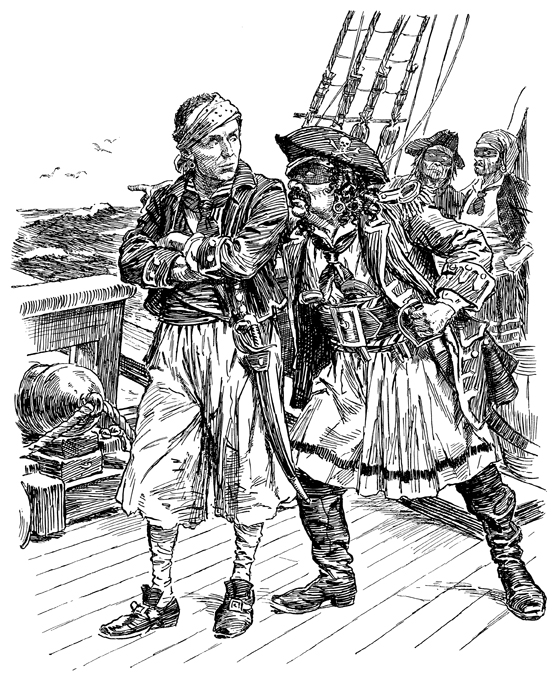 With
temptation – or necessity as Stede
preferred to think of what they did –
having caused him to stray over to the
dark side once again, he realized the need
to protect his pardon. If anyone got wind
of what they were doing, they would once
again be hunted men. So Stede Bonnet
became Captain Thomas and Revenge,
the Royal James. With
temptation – or necessity as Stede
preferred to think of what they did –
having caused him to stray over to the
dark side once again, he realized the need
to protect his pardon. If anyone got wind
of what they were doing, they would once
again be hunted men. So Stede Bonnet
became Captain Thomas and Revenge,
the Royal James.
Captain Manwareing and his crew were among
those who fell victim to Stede and his
men. One evening they anchored “at Cape James
about Nine a-clock at Night.” Pirates,
“well arm’d with Guns, Swords, and
Pistols,” boarded his vessel and promised
that he would come to no harm as long as
he was civil. They asked about his cargo,
which was “Rum, Molosses, Sugar, Cotton,
and Indigo.” Then Captain Manwareing was
required to accompany several pirates
“with two of his Men . . . on board the Royal
James” while four other pirates
remained on his vessel. (Information of
Capt., 49)
Now that he was formally a prisoner,
Manwareing was forced to accompany Stede
to Cape Fear River, a journey of eleven
days. By the time they finished looting
his ship, they had helped themselves to
“twenty six Hogsheads of Rum, three
Teirces, and three Barrels; twenty five
Hogsheads and Teirces of Molosses; three
Teirces and three Barrels of Sugar; two
Pockets of Cotton, and two Bags of Indigo
. . . nineteen Pistoles, two Half-Moidores
of Gold, fourteen Crowns, and a Silver
Watch . . . and one Pair of Silver Buckles
. . . .” (Information of Capt., 49)
Manwareing would remain with the pirates
and during his stay, he later testified,
the pirates “were civil to me, very civil:
But they were all very brisk and merry;
and had all Things plentiful, and were
a-making Punch, and drinking.” (Tryals,
13)
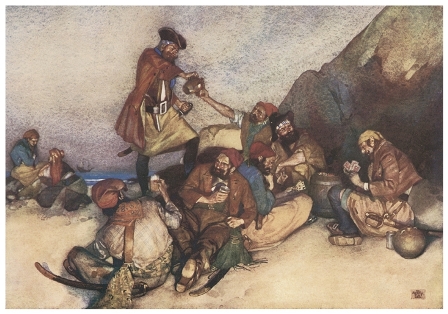
Pirate scene from The Pirates of Penzance
(1911) by William Russell Flint
(Source: Dover's Pirates CD-Rom & Book)
Although the shores of Cape Fear were
sparsely populated, word spread that
pirates were in the area.
[A] Pirate Sloop of ten
Guns and sixty Men was at Cape Fear
River, to the Northward of this Port,
with two Prizes, and had there begun
to careen and refit. (Moss, 102)
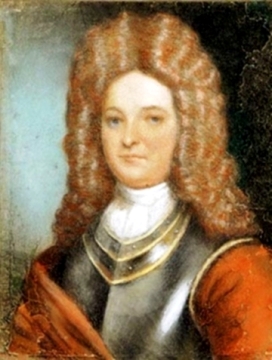 The Council
of South Carolina heard the rumors and
took them seriously; they were not in the
mood for a repeat of Thache’s blockade.
One of the leading citizens of Charles
Town and the colony’s receiver general, Colonel William
Rhett, volunteered to hunt down the
pirates. Not wishing to look a gift horse
in the mouth, Governor
Robert Johnson accepted and
immediately issued the necessary paperwork
for Rhett to proceed. Once preparations
were completed, he set sail with two
sloops under his command: the eight-gun Henry
(seventy men) and the eight-gun Sea
Nymph (sixty men). John Master and
Fayrer Hall were the captains of the two
vessels, respectively.5
Rhett was on board Henry. The Council
of South Carolina heard the rumors and
took them seriously; they were not in the
mood for a repeat of Thache’s blockade.
One of the leading citizens of Charles
Town and the colony’s receiver general, Colonel William
Rhett, volunteered to hunt down the
pirates. Not wishing to look a gift horse
in the mouth, Governor
Robert Johnson accepted and
immediately issued the necessary paperwork
for Rhett to proceed. Once preparations
were completed, he set sail with two
sloops under his command: the eight-gun Henry
(seventy men) and the eight-gun Sea
Nymph (sixty men). John Master and
Fayrer Hall were the captains of the two
vessels, respectively.5
Rhett was on board Henry.
Consequences
of Temptation
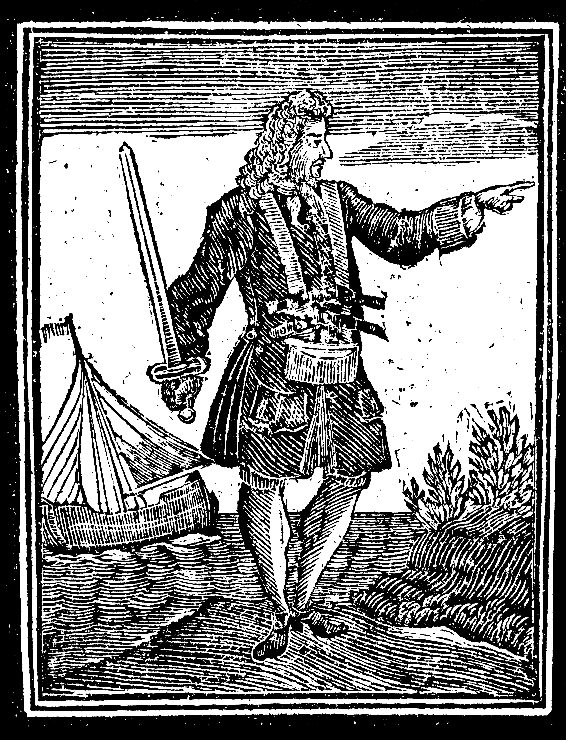 When Colonel
Rhett’s sloops reached the harbor entrance
in 1718, they stopped at Sullivan’s
Island. There, Rhett encountered a
shipmaster named Cook, who had come north
from Antigua. He had just survived a
pirate attack by the notorious Charles
Vane, and his wasn’t the only vessel
that had been taken. As far as Rhett was
concerned, Vane posed the greater threat
to Charles Town, so he and his men went in
search of Vane. Finding no trace of
these pirates, Rhett resumed his original
plan and, on 26 September, Henry and
Sea Nymph arrived at Cape Fear
River. When Colonel
Rhett’s sloops reached the harbor entrance
in 1718, they stopped at Sullivan’s
Island. There, Rhett encountered a
shipmaster named Cook, who had come north
from Antigua. He had just survived a
pirate attack by the notorious Charles
Vane, and his wasn’t the only vessel
that had been taken. As far as Rhett was
concerned, Vane posed the greater threat
to Charles Town, so he and his men went in
search of Vane. Finding no trace of
these pirates, Rhett resumed his original
plan and, on 26 September, Henry and
Sea Nymph arrived at Cape Fear
River.
Before long, the hunters spied the masts
of what they assumed were the pirate ship
and her prizes. Unfortunately, both Henry
and Sea Nymph ran aground and
it was dark before they got free. During
this time, the pirates had spotted the
newcomers and Stede sent out three canoes
to find out who they were. It didn’t take
long for his scouts to learn the truth and
hie back to the Royal James (Revenge)
with their alarming news.
Stede issued orders to prepare for battle.
Although not everyone was keen to heed
them, he gave them no choice. One pirate
later testified that “Major Bonnet declared,
if any one refused to fight, he would blow
their Brains out.” (Tryals, 19)
Ignatius
Pell, who would testify for the
Crown, concurred. Stede had been about to
deal with a pirate named Thomas Nichols,
but “one that Major Bonnet loved
very well,” had just been slain.
Otherwise, he would have “blowed his
Brains out; for he had his Pistol ready.”
(Tryals, 25)
Death might be
the consequence for his men if they dared
to refuse, but Stede wasn’t about to let
South Carolinians escape without
consequences either. He summoned one of
his prisoners, Captain Manwareing, with
whom he shared a letter that he had
written.
[I]n case the Vessels which
then appeared . . . were sent from South
Carolina to fight
or attack them, and he got clear off,
then he the said Bonnet would send
that Letter to the Governor of South
Carolina.
. . . the
Substance of that Letter . . . did
contain in effect, That he the said Bonnet
would burn and destroy all Vessels
going in or coming out of South
Carolina. (Affidavit, 50)
Of course, the
two hunters were from South Carolina, but
even had he known of the threat, Rhett
wasn’t about to back down.
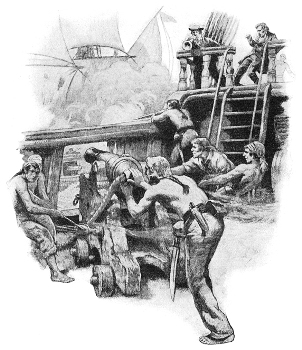 Stede was
determined to get free and devised a plan.
The next morning, the pirates weighed
anchor and headed for the Atlantic. Stede
intended to pass the intruders with all
guns blazing; his hope was that the
hunters would be so disabled that pursuit
would be impossible. This would then allow
Royal James to have free access to
the ocean and freedom. Rhett, on the other
hand, had other plans. He placed his
sloops so that the Royal James
would have to sail between Henry and
Sea Nymph, opening the pirates up
to broadsides from both directions. Stede was
determined to get free and devised a plan.
The next morning, the pirates weighed
anchor and headed for the Atlantic. Stede
intended to pass the intruders with all
guns blazing; his hope was that the
hunters would be so disabled that pursuit
would be impossible. This would then allow
Royal James to have free access to
the ocean and freedom. Rhett, on the other
hand, had other plans. He placed his
sloops so that the Royal James
would have to sail between Henry and
Sea Nymph, opening the pirates up
to broadsides from both directions.
Of course, no one asked the river what it
had planned. The water was shoaly and
narrow, making it easy for vessels to run
aground. Which was exactly what happened
to all three sloops. Then it became a race
to see which one got free first. In the
meantime, the donnybrook became a
free-for-all.
Henry and Royal James were
close enough to each other to exchange
small arms fire. The former
lay within musqt. shott of
the pirate, and the water falling away
(it being ebb) she keel’d towards him,
which exposed our men very much to
their fire, for near six hours,
dureing wch. time they were engaged
very warmly, untill the water riseing
sett our sloops afloat, about an hour
before the priate . . . (America,
Oct. 21. 730.)
This meant that
Henry leaned toward Royal
James, making it easier for the
pirates to pepper the hunters with lead. Royal
James leaned away from their
pursuers, prohibiting Rhett and his men
from effectively targeting the pirates.
While Sea Nymph was also aground
and in range of Royal James’s guns,
her crew could do little to help Rhett and
his men. This stalemate went on for five
hours, with the Henrys and the Jameses
taunting each other in between pistol
shots.
As the tide came in, Henry floated
free first. The sloop retreated to deeper
water and set about making repairs. As
soon as they were ready, Rhett headed
toward the Royal James. He
expected heavy fighting; instead, the white
flag of surrender had been hoisted.
Although a few pirates objected to
yielding, Rhett took command of the pirate
sloop with little interference. This was
when he found out exactly whom he had
captured. (Remember, Stede had been using
an alias.) Rhett was delighted to hear he
had captured Major Bonnet.
The final tally of casualties? Seven
pirates died; five suffered wounds, some
severe enough that two more soon
succumbed. The Henrys lost ten men and
fourteen were wounded. Sea Nymph’s
losses were relatively few: two killed,
four injured.
Three days after what became known as the
Battle of Cape Fear River or the Battle of
the Sandbars, the five sloops – Rhett’s
two, the pirates’, and the two freed
pirate prizes – departed the river on the
last day of September 1718. They arrived
in Charles Town on 3 October “to the great
Joy of the whole Province.” (Prefatory, v)
Two days passed before any of the pirates
were offloaded. One reason for the delay
might have been because Charles Town
lacked a gaol. Instead, Provost Marshal
Nathaniel Partridge oversaw the transfer
of thirty pirates to the Watch
House, “constructed around 1701 at
the intersection of Broad and East Bay
Streets.” (Butler) According to the
legislators, it was to be “a brick watch
house, capable of containing thirty men.”
(Butler) The building’s interior
must have included some
sort of interior partition that
separated the watchmen and their arms
and accoutrements from their
prisoners. The partition probably
consisted of a masonry wall, or
several partial walls, that
incorporated some arrangement of iron
bars to create a cage-like enclosure
within the larger interior space. . .
. Considering that it was intended to
hold a relatively small number of
people for a matter of hours, however
. . . it probably occupied a
relatively small portion of the
building’s footprint. (Butler)
The only pirate
who did not have to suffer the rank smell
and crowded confines of the Watch House
was Stede. He stayed in Partridge’s house.
Once David Herriot and Ignatius Pell
agreed to turn king’s evidence, they were
taken from the Watch House and confined
with Stede. Two sentries stood guard
outside to make certain the prisoners
stayed within.
How closely the sentries watched became a
matter of debate. On 24 October, Stede
donned women’s attire and escaped with
Herriot. With the help of three slaves
belonging to Richard
Tookerman, a local resident, the
escapees fled in a canoe. It wasn’t long
before people spoke of collusion and
bribery whenever they discussed the
escape. Attorney General Richard Allein
would even make mention of these at the
upcoming trials.
I am sensible, Bonnet
has had some Assistance in making his
Escape; and if we can discover the
Offenders, we shall not fail to bring
them to exemplary Punishment. (Tryals,
9)
“Hue and
Crys and Expresses by Land
and by Water” were sent out,
but there was no word of the escapees even
though Governor
Johnson offered a bounty of £700 for
Stede’s return. (Tryals, 9) So, the
governor called for Colonel Rhett, who set
forth once again to recapture Stede.
Shortly after the pirates were
incarcerated, the legislature passed “An
Act for the more speedy and regular Trial
of Pirates.” This statute allowed South
Carolina to appoint “the judge or judges
of the Admiralty or Vice-Admiralty . . .
[who] shall have full power to do all
things in and about the inquiry, hearing,
determining, adjusting and punishing,” as
well as to try the accused and impanel
“twelve good and lawful men, inhabitants
of this Province” to sit in judgement of
the defendants. (Cooper, 42)
Backed by this new law, the trials of the
pirates could begin. They would be tried
in batches because the vice-admiralty
court was held in the home of Garret
Vanvelsen, a prominent shoemaker in the
city. Nicholas
Trott presided over all the trials.
He was the nephew of Sir Nicholas Trott,
who had governed the Bahama Islands in the
late 1600s and made the mistake of
accepting a bribe from Henry
Every, one of the most infamous
pirates of his day. South Carolina’s chief
justice would not repeat his uncle’s
mistake. As far as he was concerned,
pirates were hostis humani generis
(enemy of mankind). While he oversaw the
trials, his brother-in-law, William Rhett,
was out hunting the escapees.
Helping Trott
were ten assistant judges. Six were
attorneys: George Logan, Alexander Parris,
Philip Dawes, George Chicken, Benjamin de
la Conseillere, and Samuel Dean. Two
gentlemen (Edward Brailsford and John
Croft) also served as did two captains,
Arthur Loan and John Watkinson. The
pirates would be tried by Richard Allein,
South Carolina’s attorney general, and
Thomas Hepworth, assistant prosecutor.
This was a period in judicial history when
the thinking of the court was that an
innocent defendant “‘ought to be able to
demonstrate it for the jury by the quality
and character of his reply to the
prosecutor’s evidence.’” (British,
2:xii) Therefore, the pirates had no need
for “defence lawyers to object to or probe
the state’s case.” (British, 2:vii)
Equally true in this time was that juries
weren’t necessarily impartial and they
were rarely on the same footing socially
and financially as the pirates. They often
owned property – pirates didn’t legally –
and they were upstanding citizens – by
definition, piracy was a crime. The men
who sat on the upcoming trials “were court
‘insiders’ who heard several cases each
session and enjoyed a working relationship
with the judge that expedited the business
of justice but often led them too easily
to endorse the inequities of the legal
system.” (British, 2:xiii) For
these trials there were essentially “two
juries (with minor variations in
membership) . . . the first jury sat on
the first, third, fifth, sixth, eighth and
tenth trials; the second jury on the
second, fourth, seventh and ninth.” (British,
2:323) Thus, “impartial” wasn’t
necessarily a descriptor of those who
served in judgement on the thirty-four
pirates, including Stede, indicted for two
piracies: the Francis under the
command of Peter Manwareing, and the Fortune,
whose master was Thomas Read. Except for
James Wilson (Dublin, Ireland) and John
Levit (North Carolina), thirty pled not
guilty to these charges. Daniel Perry of
Guernsey pled guilty to one indictment and
not guilty to the other.
Continue
reading
Notes:
1. Between
1689 and 1740, an able-bodied seaman
(AS) earned 25 to 55 shillings per month
or £15 to £33 a year. (Ordinary seamen
and those rated lower earned less,
whereas officers earned more in the
merchant marine.) That £15 in 1717 (when
Bonnet sailed) equates to UK £2,603.52
or US $3,281.44 in February 2024. The
higher amount equates to UK £5,727.74 or
US $7,219.17 today. (This information
comes from Peter T. Leeson’s The
Invisible Hook (Princeton, 2009),
the Bank
of England’s Inflation Calculator,
and Xe.com.)
2. Sixty-six of La
Concorde's crew and 455 slaves were released
on Bequia Island. Several barrels of beans were
given them for food. Perhaps enjoying the irony,
Thache gave Captain Pierre Dosset a previously
captured sloop named Mauvaise Rencontre,
which in English meant "Bad Encounter."
3. The hanging of six pirates
to which Thache refers pertains to the trial of
the survivors following the demise of Samuel
Bellamy's Whydah. Two of the eight
defendants were acquitted, but six danced the
hempen jig.
4. The Triple Alliance was
formed in January 1717 as a means of protection
against Spain, which wanted to change the peace
treaty that ended the War of the Spanish
Succession four years earlier. In August of 1717,
Austria would join the alliance and the war became
known as the War of the Quadruple Alliance. It
lasted into 1720.
5. At this time, Captain Hall
had been a ship’s master for a minimum of four
years and he had worked on ships significantly
longer than that. The interesting fact is that he
was connected to Richard Tookerman, who may have
already had dealings with Stede or soon would.
Barker points out in his article that while no
documentary evidence exists as to any orders
given, the perception exists that he didn’t want
Stede to be captured, which is why Captain Hall
did not participate as fully as he might have
during the battle between Rhett’s forces and the
pirates.
Colonel Rhett certainly believed this. Two years
later, he would tell high-placed citizens of
Charles Town that he could prove that Hall was a
pirate. Hall sued, saying the claims were
slanderous. Although he won his case because Rhett
never appeared in court, he received no damages.
Resources:
“The
Affidavit of Capt. Peter Manwareing” in The
Tryals of Major Stede Bonnet. Printed for
Benj. Cowse, M. DCC.XIX., 50.
“America
and West Indies: January 1718, 1-13” in Calendar
of State Papers Colonial, America and West
Indies: Volume 30, 1717-1718. His
Majesty’s Stationery Office, London, 1930. (Jan.
6. 298.)
“America
and West Indies: May 1718” in Calendar
of State Papers Colonial, America and West
Indies: Volume 30, 1717-1718. His
Majesty’s Stationery Office, London, 1930. (May
31. Bermuda. 551)
“America
and West Indies: June 1718” in Calendar
of State Papers Colonial, America and West
Indies: Volume 30, 1717-1718. His
Majesty’s Stationery Office, London, 1930. (June
18. Charles Towne, South Carolina. 556.)
“America
and West Indies: October 1718,” in Calendar
of State Papers Colonial, America and West
Indies: Volume 30, 1717-1718. His
Majesty’s Stationery Office, London, 1930. (Oct.
21. Charles town, South Carolina. 730.)
Baker, Daniel R. “Stede Bonnet: The Phantom
Alliance,” The Pyrate’s Way (Summer
2007), 21-25.
Bialuschewski, Arne. “Blackbeard
off Philadelphia: Documents Pertaining to the
Campaign against the Pirates in 1717 and 1718,”
The Pennsylvania Magazine of History and
Biography v.134: no. 2 (April 2010),
165-178.
“Boston,” The Boston News-Letter 16 June
1718 (739), 2.
British Piracy in the Golden Age: History and
Interpretation, 1660-1730 edited by Joel
H. Baer (volume 2). Pickering & Chatto,
2007.
Brooks, Baylus C. Quest for Blackbeard: The
True Story of Edward Thache and His World.
Independently published, 2016.
Butler, Nic. “The
Watch House: South Carolina’s First Police
Station, 1701-1725,” Charleston Time
Machine (3 August 2018).
Cooper, Thomas. “An Act
for the More Speedy and Regular Trial of
Pirates. No. 390.” in The Statutes at
Large of South Carolina. Printed by A. S.
Johnston, 1838, 3:41-43.
Cordingly, David. Under the Black Flag: The
Romance and the Reality of Life Among the
Pirates. Random House, 1995.
Dolin, Eric Jay. Black Flags, Blue Waters:
The Epic History of America’s Most Notorious
Pirates. Liveright, 2018.
Downey, Christopher Byrd. Stede Bonnet:
Charleston’s Gentleman Pirate. The History
Press, 2012.
Fictum, David. “'The
Strongest Man Carries the Day,' Life in New
Providence, 1716-1717,” Colonies, Ships,
and Pirates (26 July 2015).
Hahn, Steven C. “The
Atlantic Odyssey of Richard Tookerman:
Gentleman of South Carolina, Pirate of
Jamaica, and Litigant before the King’s Bench,”
Early American Studies 15:3 (Summer 2017),
539-590.
History
of South Carolina edited by Yates Snowden.
Lewis Publishing, 1920, 1:173-182.
“The Information of Capt. Peter Manwareing” in The
Tryals of Major Stede Bonnet. Printed for
Benj. Cowse, M. DCC. XIX., 49.
“The Information of David Herriot and Ignatius
Pell” in The Tryals of Major Stede Bonnet.
Printed for Benj. Cowse, M. DCC. XIX., 44-48.
Johnson, Charles. A
General History of the Pyrates. T. Warner,
1724.
Logan, James. “James
Logan letter to Robert Hunter, October 24,
1777." Historical Society of Pennsylvania
Discover.
(Special
note, the date of the entry is misleading as the
date of the letter [viewable and downloadable here]
is 24 8 1717 or 24 August 1717. James Logan was
deceased in 1777.)
The London
Gazette. Issue
5573 (14 September 1717), 1.
Marley, David F. “Thatch, Edward, Alias
‘Blackbeard’ (fl. 1717-1718),” Pirates of
the Americas. ABC-CLIO, 2010, 2:787-799.
Malesic, Tony. E-mail posting on PIRATES about
Richard Tookerman, 26 September 2001.
Moss, Jeremy R. The Life and Tryals of the
Gentleman Pirate, Major Stede Bonnet.
Köehler, 2020.
Moss, Jeremy. “Stede
Bonnet, Gentleman Pirate: How a Mid-life
Crisis Created the ‘Worst Pirate of All Time,’”
History Extra (4 January 2023).
“Philadelphia, October 24th,” The Boston
News-Letter 11 November 1717 (708), 2.
“A Prefatory Account of the Taking of Major
Stede Bonnet, and the other Pirates, by the two
Sloops under the Command of Col. William Rhett”
in The Tryals of Major Stede Bonnet.
Printed for Benj. Cowse, M. DCC. XIX., iii-vi.
Ramsay, David. Ramsay’s
History of South Carolina: From Its First
Settlement in 1670 to the Year 1808. W. J.
Duffie, 1858.
“Top-Earning
Pirates,” Forbes (19 September 2008).
The
Tryals of Major Stede Bonnet, and Other
Pirates. Printed for Benjamin Cowse,
MDCCXIX.
Woodard, Colin. The Republic of Pirates:
Being the True and Surprising Story of the
Caribbean Pirates and the Man Who Brought Them
Down. Harcourt, 2007.
Copyright ©2024 Cindy Vallar
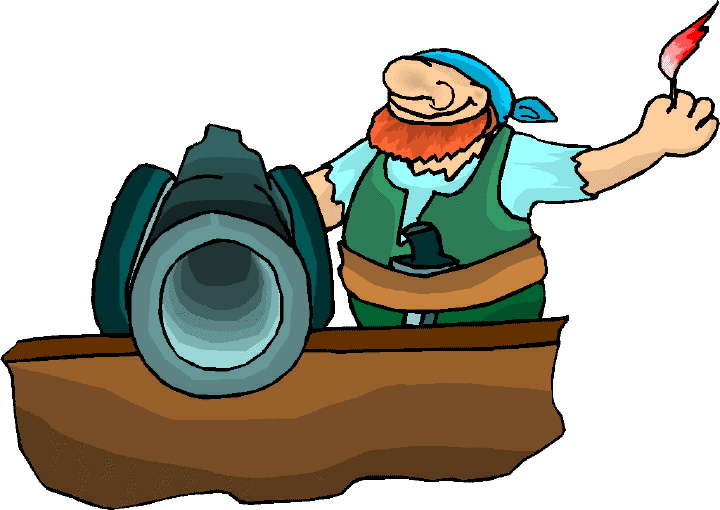
Click to contact me
Background image compliments
of Anke's Graphics |

